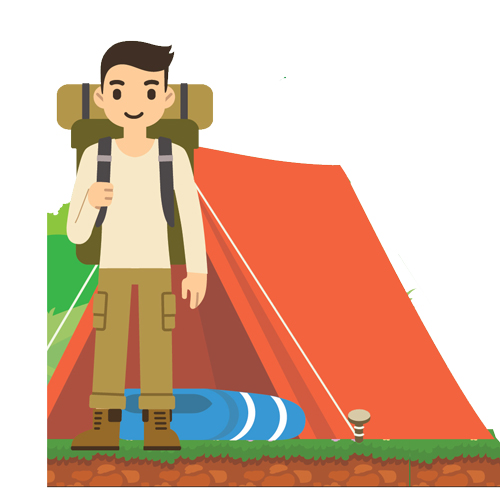Green Tips for Campers

Green Tips for Campers
(1) Plan Ahead and Prepare
Make sure you are well prepared with relevant information about the area and equipped with good outdoor knowledge and skills before set off. This can reduce the chance of injury and danger caused by lack of preparation and enrich your outdoor experience.
Proper Planning and Preparation
- Identify the physical abilities, hiking skills and experiences of the participants. Select a suitable campsite and plan your route carefully.
- Plan well and pay attention to the Regulations on camping in the country parks, camping locations, water source, toilets, fire and other facilities.
- Pay attention to the “Hints for Campers”
- Pay special attention to the latest weather and transport information.
Outfit and Gear Preparation
- Choose gear which is comfortable, safe, durable and environmentally friendly and wear moisture wicking clothing.
- Prepare for the changing weather conditions. Prepare rain gear, sunscreen, anti-mosquito repellent, warm protective clothing and personal medical kit.
- Choose lightweight and comfortable hiking shoes. Heavy boots or boots with deep corrugated soles may make the soil firm and destroy the path.
- Bring along the map, mobile phone and backup battery.
- Leave the details of your trip to a contact person such as friends and family members who are not in company with you before setting off.
- Bring along the headlamp, torch and ample of battery for lighting at night.
- Plan well for the overnight camping location and the necessary equipment required, such as tents, pegs, guy ropes, mats, sleeping bags, cooking utensils and tableware (including food container, chopsticks and water bottle).
Prepare for the Meal
- Prepare nutritious food with a portion according to your own need and the amount of physical activity to be conducted. Bring with you only the food you need.
- Ensure the hygiene of food and drinking water as well as the ease of consumption. Remove unnecessary packaging and place food in resealable plastic bags or sealable plastic containers. Avoid carrying aluminum cans and glass bottles. Proper packing saves space, reduces pack weight and minimizes the amount of waste in the campsite.
- Plan ahead how to deal with debris, peel and garbage, and avoid the smell to attract wild animals.
(2) Travel and Camp on Durable Surfaces
Trampling can undermine the growth of plants and lead to soil erosion and loss. As such, select a designated campsite in Country Park for camping.
- Keep campsites and cooking area small to prevent soil erosion around the campsite.
- Separate sleeping location and cooking area to avoid wildlife nuisance or attack.
- Do not affect or damage the vegetation around the camping area. Actions such as breaking branches, driving nails, winding wires and engraving would leave ugly traces and make trees susceptible to pests and diseases.
(3) Dispose Waste Properly
Bring with you only the food and equipment you need, and take away all your litter.
Pack It In, Pack It Out
- Keep the campsite clean. Do not litter or pollute water.
- Reduce waste, reuse or recycle useful materials.
- Use handkerchiefs instead of tissues.
- Bring your own dining utensil. Avoid using disposable utensils.
- Bring your own water bottle. Avoid using disposable plastic water bottles.
- If food waste container is available in the campsite, dispose the debris (organic waste such as peel, noodle, eggshell and shellfish etc.) into the container properly before leaving.
- Don’t handle waste by use of fire.
- Don’t bury litter which may be dug out by wild animals, or exposed in wind and rain.
- Garbage would affect wild animals. Bring your own garbage bags and take your litter home.
Disposal of Cleaning, Bathing and Human Waste
- Treasure resources. Use water and toilet paper sparingly.
- Proper disposal of human waste is important to avoid pollution of water sources, minimize the possibility of spreading disease and avoid negative impressions of someone else finding it. Pay attention to the sewage collection facilities in the campsite or bring your own bottle to take away the sewage.
(4) Leave What you Find
- Do not casually alter the natural or cultural environment.
- Do not pick plants nor take away anything from the environment.
- Do not introduce or transport exotic species such as flowers, grass, water plants to the natural environment.
- Do not abandon or release any pets to the natural environment.
- Keep backpacks, tents, boots and soles clean. Even if it is mud or soil, may also be entrained with seeds, spores or animals and plants.
(5) Minimize Use and Impact from Fires
Negligent use of fire can cause severe damage to the natural environment. Use high-efficiency cooking and lighting equipment to reduce the impact on the environment.
- Don't light fire except in barbecue areas and campsites
- Don’t bring any inflammable substances into the campsite, except cooking fuel.
- Use a torch instead of fire for lighting.
- Watch your children. Don’t let children light fire by themselves or run free while cooking.
- Don’t smoke in the campsite.
(6) Respect Wildlife
Nature is home to all kinds of plant and animal, so please respect them and try to minimize the impact you have on their lives and habits. Do not feed animals, damage anything, nor interfere with the environment or the animals. Leave them reproduce and live properly in the wild.
(7) Be considerate of Other Visitors
Share the nature with other visitors. Respect others' desire for tranquility and think carefully about how your actions might affect the environment and other visitors.
- Avoid using excessive lights and other interfering devices at night. Wear headphones when listening to radio or playing video games.
- Keep the noise down. Avoid loud voices and noises especially at night.

